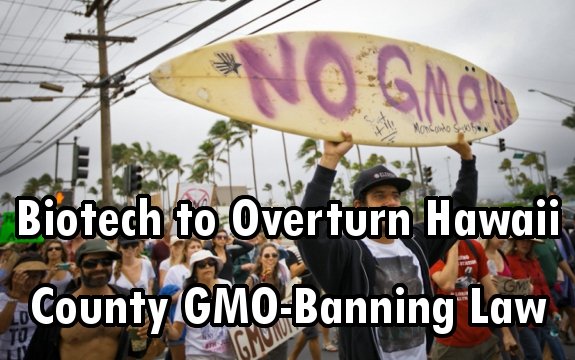Biotech Seeks to Overturn Hawaii County GMO-Banning Law

 Hawaii’s big island currently has a law restricting the use of genetically modified crops. Mayor Billy Kenoi signed Bill 113 into effect late last year. Now, several Big Ag groups and farmers have filed a lawsuit in U.S. District Court seeking to overturn the GMO ban.
Hawaii’s big island currently has a law restricting the use of genetically modified crops. Mayor Billy Kenoi signed Bill 113 into effect late last year. Now, several Big Ag groups and farmers have filed a lawsuit in U.S. District Court seeking to overturn the GMO ban.
This is the second lawsuit against a hardly six-month old law prohibiting GMOs. The law was meant to protect families by restricting open-air testing (which causes cross-pollination of organic crops) and most outdoor uses of biotech’s brainchild.
A previous lawsuit was brought to a Hilo Circuit Court in March which challenges the law’s current requirement that exempted growers (using virus-resistant papaya that was left out of the GMO ban) register their crops with the county. The lawsuit seeks to reverse the registry requirement and a temporary restraining order was granted by the court.
Both lawsuits will continue simultaneously.
The plaintiffs in the federal case — including organizations representing Big Island nurseries, papaya and banana growers, as well as cattle ranchers — are arguing that the ban on most modified crops puts the county in conflict with federal and state laws in addition to the science of biotechnology.
The lawsuit says the law is “backed by no findings or evidence that GE (genetically engineered) crops are in any way harmful, or in any way endanger the local environment.” You can bet that these farmers are backed by the biotech industry who has a vested interest in keeping the lie that ‘GM is safe’ in circulation.
Due to numerous scientific studies proving that GM crops and the ludicrous amounts of pesticides, herbicides and fungicides which they require to be grown are harmful, many nations have banned GMO altogether. Italy, Russia, Germany, Austria, France, Portugal, China, Bhutan, Greece, Switzerland, Norway, new Zealand, Thailand, Saudi Arabia, Egypt and Algeria, just to name a few, have partial or full bans in effect. Kyrgyzstan recently installed a 100% ban on GMO imports and cultivation as well.
Representing the biotech industry through plaintiffs is Attorney General Margery Bronster. Hawaii Papaya Industry Association President Ross Sibucao, who is also represented in the case, has deep ties to biotech.
Why are these huge multinational corporations so interested in Hawaii’s agriculture? And why are the seed/herbicide companies pushing Hawaii in the first place? Three words: perpetual growing season.
There is an oft-told myth by biotech that they saved the Hawaiian Papaya. In fact, Michard Fale and Colleen Meyer recently said that GMOs saved the papaya? How do organic papayas still exist then?
Bronster is joined in the federal case by three attorneys from Washington, D.C.-based Arent Fox LLP and an attorney representing the Biotechnology Industry Organization, one of the 10 plaintiffs.
Farmer Richard Ha, cattle rancher Jason Moniz, floral growers Gordon Inouye and Eric Tanouye, and Pacific Floral Exchange are also listed as plaintiffs.
The county’s law states in part that “if a new technology poses threats of harm to human or environmental health, the burden of proof is on the promoter of the technology to prove that the technology is safe.”
The GMO show down on the Big-Island continues.

Why are you so interested in propaganda marketing versus the facts. When you force farmers to fight they will!
Hawaii Farmers and Ranchers are United in their legal action, despite your rheoretic the Hawaii papaya Industry was saved from decimation by biotechnology and the improved papaya variety!
Your pushing an ill informed agenda versus truth!
It is quite apparent your are being paid by the chemical companies.
What good is a crop if it poisons the land, environment, and the people who eat the crops?
..Well said, Dave.
Are these “Pro-GE” Frankenfruit fanatics stepping up & volunteering to be the consumer TEST GROUP for a long-term study..?? It’s the only way to be sure…